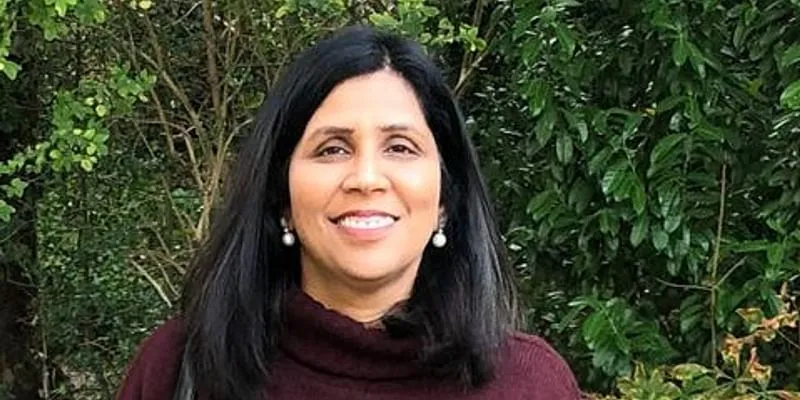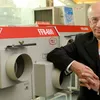Meet the woman entrepreneur making safe furniture for kids, serving over 8,000 schools globally
Popcorn Furniture, founded 20 years ago, is designing and making safe furniture for kids. It has served more than 8,000 schools across the world, including in Dubai and Africa.
started 20 years ago when Deepika Goyal went to buy furniture for her kids, and realised that there weren’t many brands making kid-friendly furniture.
She recalls, “Whatever was available had pointed edges and were sharp. They weren’t the kind you would want to use for your kids.”
At present, Popcorn Furniture has become a well-known name in India as well as around the world. The company, run by Deepika and her husband Ashok Goyal, began by supplying basic furniture to schools in Delhi-NCR. It has now become a one-stop solution for many educational bodies.
Popcorn Furniture designs, manufactures, and installs furniture for schools and colleges while catering to all infrastructural requirements for playgrounds, gymnasiums, cafeterias, and dormitories.
The company sources raw materials from India and manufactures the products in its unit in Gurgaon. All the production is done using machines imported from Germany.
The Delhi-based company boasts of an impressive clientele of 8,000 schools in India including the likes of Shiv Nadar School, Amity International School, The British School. It is also exporting furniture to schools in more than eight countries, and has retail stores in Delhi, Dubai, and Cape Town.
While Deepika refused to share the turnover of the company, she claims that Popcorn Furniture is growing 15 to 20 percent every year.
In a conversation with SMBStory, Deepika tells us about her journey, the challenges, and how different selling is in and out of India.

Deepika Goyal, Director of Popcorn Furniture
Edited excerpts below:
SMBStory (SMBS): How did you begin your journey?
Deepika Goyal (DG): When we realised that there was hardly any brand for kid’s furniture, we came up with the idea of starting our own company. We started by importing some kindergarten furniture from Thailand, which had safe surfaces, completely rounded edges and completely made from recycled rubberwood.
Our first client was Apeejay Schools. It became a big hit, and helped spread the word thereafter.
We have realised that school furniture is not like usual furniture. This business was born out of a lot of passion. Popcorn Furniture was started with the mission to make learning fun for children. And that is what our designs also reflect.
Initially, we got a team of designers but soon we started designing on our own. All this while, safety remains of paramount importance to us.

Designed by Popcorn Furniture
SMBS: When you entered the industry, how was the market like? What were the challenges you faced?
DG: We faced a lot of challenges. The first was getting product designers because very few people in India at that time understood product design.
In addition, furniture meant a carpenter making tables and chairs. So, it was an organised player coming into a highly unorganised sector. Setting up the manufacturing units and operations in an organised manner was another challenge.
In addition, we were aware that there would be price comparison because we were trying to sell furniture completely made from machines. There is a difference between solid wood furniture and furniture made by machines.
When we entered the market, schools were under the impression that solid wood furniture was better because it would last for more than 20 or 30 years. We had to explain that using machines for making furniture is more economic, collaborative, and flexible.
Another challenge we faced during our journey was a lot of other players started copying our designs and work. Some even went on to mention the word ‘Popcorn’ in their catalogues.

Designed by Popcorn Furniture
SMBS: What were the key elements that shaped your success?
DG: First was the customisation in terms of colours and design. This is very important because no two schools want to look the same. Innovation in the product is an important ingredient if you want to build a successful and sustainable business.
Every year, we came up with a new catalogue.
It is a trend followed by international furniture companies all over the world because it incorporates all the changes that have happened over the year.
In addition, word-of-mouth certainly helped in expanding the network and reach.
SMBS: Being in the business for more than 20 years, how has the market and customer evolved?
DG: Today, the world is all about fashion and effects. In the earlier days, Indian schools were rigid and had a conservative approach when it came to installing furniture, which mostly consisted of dark solid wood. Things have changed enormously now. There is also a lot of western influence of using bright, vibrant colours.
All good schools have a curriculum, which is very collaborative and progressive. We had to change the design of the furniture according to the curriculum of the school.
For example, we have a lot of furniture which is on casters, which means you can rearrange the classroom within a matter of a minute. It can be rearranged to any configuration, which will enable children to work in groups of two, three, four and even individually.
We also came up with furniture that had writable surfaces.

Designed by Popcorn Furniture
SMBS: In your type of business, which is mostly in a brick and mortar format, how important is digitisation?
DG: We are primarily a B2B company but since we got a lot of retail enquiries, we now sell on online platforms such as Amazon and Pepperfry.
Moreover, digital marketing is very important these days. Like all people, we are also leveraging Search Engine Optimisation (SEO), Google Adwords, and social media platforms like Facebook and Instagram.
In addition, we are also using CRMs to maintain databases and recognising trends.
SMBS: How is the business coping with the COVID-19 situation?
DG: This is a very unique and difficult situation for all of us. But I think it is a more difficult situation for young children. How do you explain coronavirus to a five-year-old?
We have partnered with psychiatrist Dr Ranjan Ghosh to disseminate information to parents through our social media platforms. He can help parents ensure that they are not under any psychological pressure, have a routine when everything can seem so haphazard, and really help them in explaining the situation to the children.
Edited by Saheli Sen Gupta










